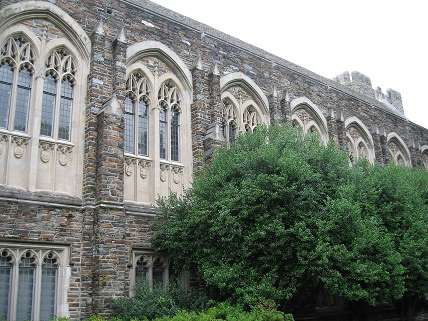Gross Injustice at Duke: Accused Student Found Responsible Via 'Indirect-Double-Hearsay'


Lewis McLeod, a Duke University student who was found responsible of sexual misconduct by the administration and faces expulsion, has sued the university for violating his due process rights. His lawsuit sheds light on Duke's adjudication process—and no one who reviews the shocking details could conclude that the procedure was anything other than a total farce.
Over at Minding the Campus, KC Johnson provides a thorough accounting of everything Duke allegedly did wrong in the McLeod case, which hinged upon whether McLeod's accuser was too intoxicated to properly give consent when they had sex. The university hired an independent investigator, Dr. Celia Irvine, to determine the facts of the case. Irvine's methods were "odd," according to Johnson; she failed to interview key witnesses and the witnesses she did contact were interviewed over the phone, rather than in person.
Perhaps most galling, Irvine didn't even testify at McLeod's hearing—and was thus shielded from cross-examination. Instead, she merely submitted her report to the hearing committee, making it impossible for McLeod to defend himself:
Having completed her report, Irvine didn't testify before the hearing—denying McLeod an opportunity to cross-examine her about her investigative techniques; and, perhaps more important, denying McLeod an opportunity to ask her follow-up questions about the witnesses that she did interview. Nor did most of the students interviewed by Irvine testify at the hearing. As a result, McLeod's attorneys point out, the student was convicted on the basis of "indirect double-hearsay" evidence. This double-hearsay material included an anonymous witness who said that he or she saw the accuser incapacitated on the night of the incident. In a remarkable coincidence, that anonymous witness made his or her presence known to Irvine on the same day that Irvine asked the accuser about her violation of a mutual no-contact order between the accuser and McLeod.
About that no-contact order: The accuser violated it by attending a party at McLeod's residence. She had been told—by Sheila Broderick of the Duke Women's Center, allegedly—that the accuser was allowed to violate the no-contact order.
McLeod's lawsuit alleges that Duke engaged in all sorts of wrongdoing. His complaint claims that the university actually put substantive limits on Irvine's inquiry, prohibiting her from interviewing certain witnesses. McLeod also alleges that Irvine's status as a private investigator was not made known to him—if it had been, he could have impeached her report. Duke administrators also dissuaded McLeod from seeking an attorney and allegedly told him, "You can get it when you sue us," in response to his request to see copies of the university's new policy on punishments for convicted students.
No one could contend that this process was just. But as the Foundation for Individual Rights in Education's Susan Kruth notes, the consequences for McLeod are massive:
The result of these failures could be life-changing for McLeod despite the fact that a three-person panel was tasked with making the ultimate decision regarding his guilt or innocence. An unfair outcome is even more likely at universities that rely solely on a single investigator to serve as detective, prosecutor, judge, and jury in these cases, with no one who might possibly serve as a counterbalance to an investigator's biases or incompetence.
These miscarriages of justice are staggering, and yet they are common features of nearly every university rape investigtion I have come across. The only sane thing to do is demand that the adjudication of crimes be reserved for the professionals.
Edit: The headline of this article was changed.


Show Comments (100)